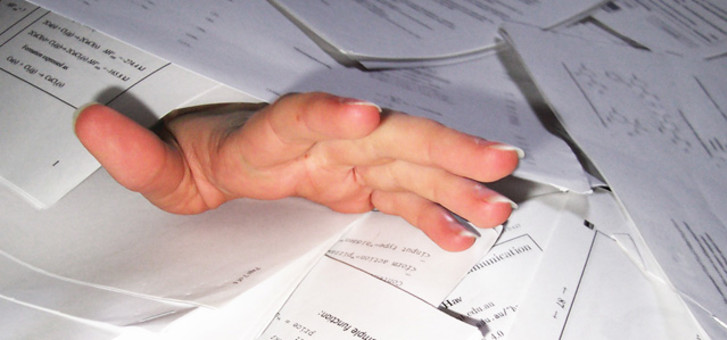What is holding you back from getting organised? Most likey you! Here are five common obstacles, and what you can do about them.
1. I’d rather do something else
Let’s face it. We’d all rather be doing something fun, right? If given a choice between organising files and watching a favourite TV program, it’s pretty clear what most people would choose.
One way to overcome this obstacle is to schedule your organising projects for first thing in the morning. Do your project for an hour or so, and be done with it. Once it’s out of the way, your day will be free to do things you really enjoy.
Another way to combat this mind-set is to make something you love to do dependent upon the completion of your organising project. For instance, don’t allow yourself to read a magazine or newspaper until you’ve done the laundry or washed the car, which you’d promised yourself you’d do today.
2. All-or-nothing
You may be reluctant to start an organising project because you only like to start things that you know you can finish in one session. Waiting until you can do the whole thing‚ often ends up in nothing getting done.
It is better to start something and progress a little, than to not start something and to not progress at all. Often organising a project that doesn’t get started, makes the project seem worse over time.
If it’s difficult for you to leave a project unfinished, your best bet is to give yourself smaller projects that you can complete in less time. For example, you may want to organise your desk, but you know it’s going to take you a few hours, and you can’t seem to find a few open hours in your schedule.
Organising the entire desk might be too large of a goal. But, if you say to yourself that you’re going to clear off the papers from the top of the desk today, empty out the top drawer tomorrow, organise the supply drawer the next day, and so on, now you’ve given yourself projects that can be started—and completed—within short bursts of time, thus satisfying your all-or-nothing tendency.
Myths of being organised
-
BEING organised MEANS BEING NEAT.
While you can certainly be neat and organised, the two should never be confused. While you might have neat piles or boxes in a straight line, you may still not be able to find a single thing when you need it. Being organised means using a structured system that allows you to do or find everything you need, without frustration, chaos or stress.
-
TO BE organised is TO BE CLEAN.
Once again, while you can be both organised and clean, the two shouldn’t be confused. Cleaning means you’re removing dirt, grime and otherwise preparing a sanitary surface. But, you can have the cleanest home or office and still be disorganised and inefficient.
-
TO BE organised MEANS TO SCHEDULE EVERY MINUTE.
While thoughtfully scheduling appointments, projects and jobs is recommended, you do not have to schedule every moment of your day to be organised. Scheduling is the fine art of packing every day just full enough of the most useful activities. Never overload it. Your schedule should always allow you time for spontaneity.
-
ONLY CERTAIN TYPES OF PEOPLE CAN BE organised.
While a small percentage of people don’t have the ability to be organised, such as someone with an illness, most people can be. Being disorganised isn’t a disease; it’s a decision. If you really want to be organised, there are systems to help you. Once you know these systems and apply them, you’ll be organised.
-
BEING organised TAKES a LOT OF TIME AND EFFORT.
The truth is, it takes less of both to be organised. Disorganisation and its associated inefficiency takes more time, and ensures that huge obstacles are directly in the path of getting things done. Getting and staying organised isn’t rocket science.
-
EVERYONE I KNOW IS organised, EXCEPT ME.
Being organised is both an outer and inner trait. Unless you really know a person well, you really can’t come to this conclusion. For example, someone may have a neat home, but is never on time.
Another may have an organised home, but his office filing system is chaotic. There are many people in need of organisation, even if it doesn’t show.
-
Organised PEOPLE HAVE NO FUN.
On the contrary, the people who are organised are saving time and getting the best out of life. They are getting things done. They’re achieving their goals. They’re not wasting time searching for lost items, or redoing things or missing appointments.
They’re finding the time they need to do the things they love, and to spend time with the people they care about.
3. Broad goals and priorities
Just making the statement I have to get organised is too broad. It often results in an overwhelming I don’t know where to start feeling. It’s important to define exactly what you want to organise. Rather than saying you want to get organised, make a list of the specific things you’d like to organise, such as your wardrobe, or your filing cabinet at work, or your schedule.
Next, prioritise your list. The tasks closest to the top should be those currently causing you the most stress. Once you prioritise your list, choose one or two of those tasks to work on. You really have to focus in order to complete something. Once these few tasks are completed, you can then move on to the next few.
Once you choose your one or two tasks, break them down into smaller mini-goals. If you’d like to organise your pantry, you may break it down into top shelf, middle shelf and lower shelf. Tackle tasks that can be completed easily, in small brackets of time.
4. A sense of attachment
Sometimes it’s really difficult to part with things because you may feel a sense of attachment. Perhaps you’re a sentimental person. Every item you own reminds you of something else—a family member who passed away, something an old friend gave you, a sweater from your mum, the first stuffed animal your significant other gave you.
Or, you may be a thrifty person, and feel you may be able to use something some day. Perhaps you’re saving it just in case it comes back in style, or if you decide to have another child, or if you decide to pick up that hobby again in the future.
Whatever the reason for your sense of attachment, having such attachments can result in piles upon piles of clutter. If it begins to stress you out, it’s time to let go of some of your stuff.
You don’t have to get rid of everything, but it is important to determine what things are truly important to you and what things are just taking up space. Getting organised is about making decisions.
Choose a clutter spot to tackle. Pick up two items at a time. Try to put one of those items in a keep pile, and the other in a do-not-keep pile. Sometimes you’ll want to keep both, and sometimes you won’t want to keep either. But, try to keep this system going.
Keep picking up two items at a time and making this decision until you’ve decluttered by a minimum of 50 per cent. In other words, you should have the same amount of items in the “keep” pile, as you do in the “do-not-keep” pile.
If you don’t like to toss, then give away or donate instead. Knowing that someone else is making good use of something that was just catching dust in your home or office may help to relieve some tension.
Get organised the DAY before
So much to do; so little time. Don’t you hate to leave home or work knowing there’s still much undone? Follow this one simple strategy to see if it makes a difference to your day.
Just before the end of the day, work out what you will start on first in the morning. Create a list in a note to yourself. This lets you take stock of what you’ve accomplished, giving you a feeling of completion and the satisfaction of a job well done. Psychologically, it lets you know you are finishing your work for the day and are ready to move on to other activities. Without this psychological break, your mind could continue thinking about office issues well into the evening (“Did I remember to spellcheck that document?” “What did I call the document?”). Whatever you haven’t done today should be on a list To Do on the next.
It makes it easier to get straight into work when you get to work the following day. You won’t waste time wondering what task you should start with.
When you do the above you subconsciously set your mind to work helping you organise your approach to the next day’s tasks.
So don’t hesitate; begin organising yourself at the end of the day. You will be doing yourself and your work obligations a service!
—Sheila O’Connor
5. Fear of Failure
One of the main reasons for not starting an organising project is fear of failure. You may feel that since you haven’t been able to get organised, you never will.
Or you may feel that even if you do manage to get it organised, you might not be able to maintain it.
First, a positive attitude is essential to getting and staying organised. The best attitude is a can-do‚ attitude. Believe in yourself. You can do it!
Second, any task or project you progress on, no matter how little the progression, is a success!
Enjoy your successes and reward yourself for them.





